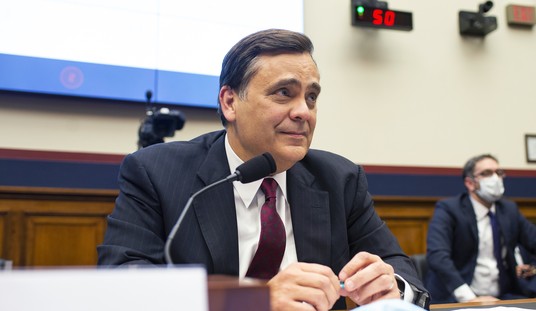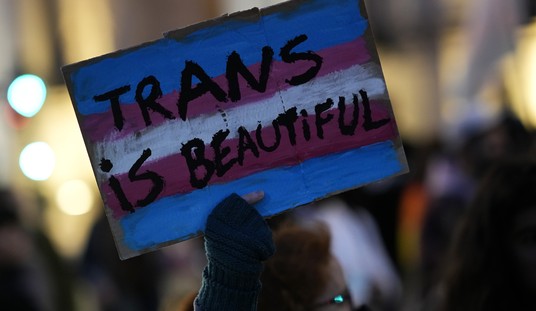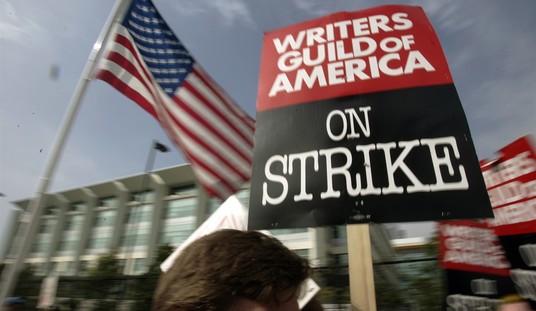Dana Loesch’s new book “Hands Off My Gun” went on sale yesterday, and naturally the liberal media immediately want it quashed and destroyed. Loesch is a favorite target for these attack groups, not least because she is such a fierce advocate for gun rights and protecting the constitutional freedoms guaranteed to Americans.
One such outlet, Media Matters for America, posted a supposed fact check of some of the Founding Fathers quotes that are included in the book. Their claim is that Dana “botches” the quotes, because as you know, girls are stupid. But the assertion requires a little more perusal, if for nothing more than satisfaction of curiosity.
Here is how the article begins. And remember, “Botches” is in the title of the post.
Conservative commentator Dana Loesch’s new book Hands Off My Gun: Defeating the Plot to Disarm America includes spurious quotes from George Washington, Thomas Jefferson, and other Founding Fathers, despite the fact that it purports to teach readers about “the history of the Second Amendment.”
Spurious, they say. Botched, they say. That is quite the pair of charges. I say “pair” because one implies malicious intent, while the other implies ignorance or stupidity. At Media Matters, they don’t like to leave any pejorative phrase unturned.
Here is an example of the “spurious” and/or “botched” quote from George Washington.
“A free people ought to be armed.” – George Washington
And the quote as posted by Media Matters:
“A free people ought not only to be armed, but disciplined; to which end a uniform and well-digested plan is requisite; and their safety and interest require that they should promote such manufactories, as tend to render them independent of others for essential, particularly military, supplies.”
MMFA reasons that Washington was advocating merely for an armed militia, not for the free people to be armed. Presumably, this is because the words discipline and uniform appear, which everyone knows are very militia-y things to say. They rely on a PBS website posting of a transcript, and a Politifact expert who helped them “translate that into 21st-century-ese.”
Dana Loesch’s book, which “went through two legal reads” for accuracy, sources the quote to Buckeye Firearms, where their page of Founding Fathers’ quotes included the version in Loesch’s book.
A third version also appears online. It, like the one MMFA used, is from a media transcription, albeit a teensy bit more contemporary than PBS. It’s from the newspaper Massachusetts Spy, which article was published on January 21, 1790. It reads: “A free people ought not only to be armed but disciplined. And to be independent of others.” The contemporary Spy reports that Washington’s context was strengthening America to be “self-sufficient domestically.”
It’s available from the Archiving Early America website, which was founded by archivist for the Keigwin and Mathews Collection of 18th century historical documents of early America Don Vitale, former senior lecturer on journalism at USC.
Botched, they say. Spurious, they proclaim. Poppycock, says reasoning.
The analysis of the language is apparently subjective, as two different experts offer two different explanations. As proof that Washington didn’t believe in the rights of citizens to own guns, MMFA has offered nothing at all. Loesch’s quote withstands scrutiny.
Another quote MMFA says was similarly wrong is from Thomas Jefferson.
“The laws that forbid the carrying of arms are laws of such a nature. They disarm only those who are neither inclined nor determined to commit crimes… Such laws make things worse for the assaulted and better for the assailants; they serve rather to encourage than to prevent homicides, for an unarmed man may be attacked with greater confidence than an armed man.” — Thomas Jefferson (quoting eighteenth-century criminologist Cesare Beccaria)
But of course, after they present Loesch’s version, they offer no other. Because there is no other. That’s just the quote. That he wrote. With his fingers.
Botched, they say. Spurious, they claim. Accurate, they mean.
They claim “Loesch presents this quote as if Jefferson were quoting Beccaria approvingly, but that is not necessarily the case.” WHOA! Not necessarily what he meant? Well call the Massachusetts Spy! We have a breaking story here! Headine “Nuh-uh, probably!”
Speaking of quoting someone incorrectly, here is MMFA’s reasoning.
Jefferson copied the Beccaria quote in Italian into his legal commonplace book, a “journal or notebook in which a student, reader, or writer compiles quotations, poems, letters, and information, along with the compiler’s notes and reactions.” Jefferson notated the copied passage with the words, “False idee di utilità,” which is a summation of the idea contained in the quotation and is not evidence of what “our Constitution’s drafters intended when they drafted and approved the Second Amendment.”
In fact, Jefferson’s notation doesn’t mean what MMFA says it does at all. Jefferson notes the passage with the phrase “False idee di utilità” in his commonplace book. The passage quoted and marked with that notation, which means “false ideas of utility”, includes examples of such false ideas.
Laws that are examples of a false idea of utility “are those which forbid to wear arms, disarming those only who are not disposed to commit the crime which the laws mean to prevent.” Well gosh, what can that mean? Luckily, it goes on:
“Can it be supposed, that those who have the courage to violate the most sacred laws of humanity, and the most important of the code, will respect the less considerable and arbitrary injunctions, the violation of which is so easy, and of so little comparative importance?”
Another example of a false idea of utility was legislators “who would sacrifice a thousand real advantages to the fear of an imaginary or trifling inconvenience; who would deprive men of the use of fire for fear of their being burnt, and of water for fear of their being drowned.” Does that sound like something Thomas Jefferson would do? Sacrifice liberty in pursuit of safety? His notation was blatantly drawing attention to these transgressions against liberty as being “false ideas,” and that includes the false idea that disarming the law-abiding citizens serves any useful purpose. To put it another way, Media Matters is dead wrong, both in their understanding of the quote, and their understanding of the Thomas Jefferson Foundation’s explanation of the quote.
In short, they have misquoted those correcting a common misattribution of a quote which was correctly quoted and attributed by “Hands Off My Gun”. Now that is a dandy of a trick.
The next is another in the ongoing absurdness of gun control nuts. This comes up over and over and over, and it is a blatantly silly premise. Here is the quote.
“Americans have the right and advantage of being armed, unlike the people of other countries, whose leaders are afraid to trust them with arms.” — James Madison
.. and the quote as Media Matters posts it:
Besides the advantage of being armed, which the Americans possess over the people of almost every other nation, the existence of subordinate governments, to which the people are attached, and by which the militia officers are appointed, forms a barrier against the enterprises of ambition, more insurmountable than any which a simple government of any form can admit of. Notwithstanding the military establishments in the several kingdoms of Europe, which are carried as far as the public resources will bear, the governments are afraid to trust the people with arms.
And their reasoning? They call it a “mangled summation of The Federalist Papers #46 that distorts Madison’s meaning.” Again, it’s “but but but that’s not what he meant.” Emanations and penumbras and all that. They then add the gun control trope that it was clear Madison was “talking about state militias being a check on government tyranny, not privately held arms.” As if Media Matters would be totally fine with a bunch of armed Texans walking around as long as they called some random guy “sir” while they did it.
In fact, what is actually clear is that Madison is saying that armed people as a check on government tyranny is an awesome idea. He says “besides the advantage of being armed” .. BESIDES that … “the existence of subordinate governments” etc etc. Let me translate that from Liberaleses: Not only is it super badass that we can own our own guns, but also we get to have big old gun-owning super clubs that are practically mini-me governments so the big britches boys in DC can’t boss us around.”
You know what else Madison said?
“A Government resting on a minority, is an aristocracy not a Republic, and could not be safe with a numerical & physical force against it, without a standing Army, and enslaved press, and a disarmed populace.”
Oh yeah, he hated private guns. Great point.
Botched, they sneer. Spurious, they whine. Completely supported by facts, say facts.
Next up is this quote by Patrick Henry:
“Guard with jealous attention the public liberty. Suspect everyone who approaches that jewel. Unfortunately, nothing will preserve it but downright force. Whenever you give up that force, you are ruined… The great object is that every man be armed. Everyone who is able might have a gun.” –Patrick Henry
And the Media Matters version:
“Guard with jealous attention the public liberty. Suspect everyone who approaches that jewel. Unfortunately, nothing will preserve it but downright force. Whenever you give up that force, you are ruined… May we not discipline and arm them, as well as Congress, if the power be concurrent? So that our militia shall have two sets of arms, double sets of regimentals, and thus, at a very great cost, we shall be doubly armed. The great object is, that every man be armed. But can the people afford to pay for double sets of arms, Every one Who is able may have a gun. But we have learned, by experience, that, necessary as it is to have arms, and though our Assembly has, by a succession of laws for many years, endeavored to have the militia completely armed, it is still far from being the case.”
Once more unto the trope, dear friends. Their reasoning, again, is “Henry was actually talking about ensuring that members of the militia were adequately armed, not the general public.”
Let’s examine their text. “May we not discipline and arm them, as well as Congress, if the power be concurrent? So that our militia shall have two sets of arms, double sets of regimentals, and thus, at a very great cost, we shall be doubly armed. The great object is, that every man be armed.”
I offer you this comparison: “We already have a health care system. But may we not create Obamacare, in addition to the private sector, if both have equal footing? So that our citizens may have two sets of protections and thus, at very great cost, we shall be doubly sure no one falls through the cracks? The great object is that every person be covered.”
The object is that every man be armed. In most of the documents linked by MMFA, it was taken for granted that where one heard militia, one heard “every able-bodied adult white male who is a citizen”. And doubly-armed obviously refers to the idea that the provision of those weapons would be a financial burden both of the Federal government and of the organized state militias, so that every man should have a gun. The gun controllers confuse methodology with intent. They presume the intent was an organized army, and the methodology was arming citizens as a militia. It is clear from volumes of context that the reverse is true. The intent was that every man be armed, the method was through the militias and the army.
Furthermore, MMFA cites a historian, who says that over the years the quote was assembled from two different speeches through the judicious use of the ellipses. Links to the speeches are provided. Here is a full excerpt from one of them.
“The honorable gentleman who presides told us that, to prevent abuses in our government, we will assemble in Convention, recall our delegated powers, and punish our servants for abusing the trust reposed in them. O sir, we should have fine times, indeed, if, to punish tyrants, it were only sufficient to assemble the people! Your arms, wherewith you could defend yourselves, are gone; and you have no longer an aristocratical, no longer a democratical spirit. Did you ever read of any revolution in a nation, brought about by the punishment of those in power, inflicted by those who had no power at all?”
This is part of a broad argument against centralized power made by Patrick Henry at the Virginia Ratifying Convention. It refers, likewise broadly, to the power of the individual states but also to the power of individual citizens. “How different from the sentiments of freemen, that a contemptible minority can prevent the good of the majority,” he argues. The entire philosophical basis of his days of speech-making is abundantly, overtly clear: that the tyranny of government is inevitable, that it must be prepared against, and that such preparation necessarily means empowered citizens with arms speaking as force. This is the most elementary and clearly stated case for the Second Amendment as a bulwark against the terror of a dictatorial, centralized federal government as can possibly be made. Literally, arm the people so they can shoot back if the government gets a wild hair. It could not be more clear.
And at long last we come to Thomas Paine. Here is the quote from “Hands Off My Gun”:
“Arms… discourage and keep the invader and plunderer in awe, and preserve order in the world as well as property… Horrid mischief would ensue were [the law-abiding] deprived the use of them.” –Thomas Paine
.. and here it is from Media Matters:
“… arms like laws discourage and keep the invader and the plunderer in awe, and preserve order in the world as well as property. The balance of power is the scale of peace. The same balance would be preserved were all the world destitute of arms, for all would be alike; but since some will not, others dare not lay them aside. And while a single nation refuses to lay them down, it is proper that all should keep them up. Horrid mischief would ensue were one half the world deprived of the use of them …”
This is a quote about armed nations according to Media Matters. In it, Thomas Paine makes the following reasonable argument: If no nations had guns, then all nations would equally not have guns. But since nations will have guns, nations are only equal that likewise have them. Paine is specifically referring to arms. To guns. Now in the first case, that argument as a philosophical point could not be more obviously or easily applicable to individuals as well as nations. Eg: If nobody had guns, everyone would equally not have guns. But since some criminals will have guns, law-abiding citizens are only equal who likewise have guns. Pretty simple.
But there is, of course, more. The section heading of the work where Thomas Paine wrote this is, indeed “Thoughts On Defensive War.” And it begins thus:
Could the peaceable principle of the Quakers be universally established, arms and the art of war would be wholly extirpated: But we live not in a world of angels. The reign of Satan is not ended; neither are we to expect to be defended by miracles. The pillar of the cloud existed only in the wilderness. In the nonage of the Israelites. It protected them in their retreat from Pharaoh, while they were destitute of the natural means of defence, for they brought no arms from Egypt; but it neither fought their battles nor shielded them from dangers afterwards. I am thus far a Quaker, that I would gladly agree with all the world to lay aside the use of arms, and settle matters by negotiation; but unless the whole will, the matter ends, and I take up my musket and thank heaven he has put it in my power.
“I take up my musket and thank heaven he has put it in my power.” I, he says. My, he adds. You see, above we used the defense of a nation to justify the defense of a man. But in full work, it is clear Paine means precisely the opposite.
“That which allures the Highwayman has allured the ministry under a gentler name.” The purpose of the metaphor is to use what is supposed to be commonly understood as self-evidently true: that man would defend himself against a robber. He is justifying the use of arms by the nation in the terms that would be most obvious to his contemporaries. If a man can hold a weapon in defense of himself, therefore cannot a nation bear arms the same? “In the barbarous ages of the world, men in general had no liberty. The strong governed the weak at will,” he says. “The peaceable part of mankind will be continually overrun by the vile and abandoned, while they neglect the means of self defence.”
It is a truth he finds inarguable. “For while avarice and ambition have a place in the heart of man, the weak will become a prey to the strong. The history of every age and nation establishes these truths, and facts need but little arguments when they prove themselves.”
Additionally, his defensive war argument is not some mere justification of the existence of war in the abstract, as Media Matters suggests. It is entirely specific to the time and place, to the American revolution, and to the defense of the colonists through their own arms. Defensive war. As waged by armed citizens. “The live of hundreds of both countries had been preserved had America been in arms a year ago.”
Botched, they intoned. Spurious, they protest. Self-evident, says Thomas Paine.
Loesch has included quotes from the Founding Fathers to establish again what was at the time so well understood as to barely be worth remarking on. That a citizen of America was entitled to retain his natural, God-granted right to defend himself, his liberty, and his property, by arms if necessary. The barest study of just the documents provided by Media Matters itself bears out the truth of this. Far from correcting “Hands Off My Gun”, MMFA has provided ample documentation of just how right Dana Loesch is. The founders, the framers, intended for the right of each citizen to bear arms to be protected and not infringed upon.
Revisionist attempts have not, and will not, unwrite what has been written, undo what has been done, or disarm we who have been armed.
“Hand Off My Gun: Defeating The Plot To Disarm America“ is the new book from Dana Loesch that just went on sale this week. It does, among many other things, talk about the Founding Fathers.
Here is an excerpt from the chapter about the Founding Fathers and their message on guns.
CHAPTER 8
FOUNDING FIREARMS
Rarely in history have so many people quoted the United States Constitution and yet seemed deliberately obtuse to its meaning than have the members of the United States Congress. Why that still comes as surprise probably says more about me than it does about them. Let’s face it. Liberals always have had a love-hate relationship with the Constitution — they love it when they can use it to abort babies or let gay people get married. They hate it when its language gets in the way of their big-government schemes, like censoring conservative media outlets or investigating troublesome, truth-telling journalists. They especially hate the fact that the Constitution explicitly — yes, explicitly — protects gun owners. To get around that inconvenient truth, the left does what it does best: It denies that things say what they actually say, or mean what they actually mean. Or as everyone’s favorite sexual harasser once famously put it, “it depends on what the meaning of is is.”
The gun grabbers’ useful idiot, Sen. Chuck Schumer, once claimed that his fellow Democrats needed to admit that there was such a thing as a Second Amendment that gave people “a constitutional right to bear arms.” But before we think Senator Schumer was actually on our side, he went on in the same breath to call for a “compromise” that allowed the left to ban a whole bunch of different guns and thus infringe on that aforementioned constitutional right to bear arms.
Things got a little testy in the Senate in 2013 when Ted Cruz tried to explain to Diane Feinstein that the Second Amendment protected gun owners. “I’m not a sixth grader” she snapped, as she continued to argue that the Second Amendment was irrelevant to her latest gun-grab legislation. (Respectfully, I would argue that most sixth graders understand the Second Amendment, and civics, better than Senator Feinstein.) Liberal academics given a megaphone by various media outlets, have told us again and again that the Second Amendment doesn’t mean what we think it means or it doesn’t mean what it says. Always good for a laugh, the Huffington Post once went even further with the #WTFbananas headline: “The Second Amendment Demands Gun Control.”
It’s long past time for a basic tutorial on the Constitution. Our founders meant for it to be read, not trampled under foot. We should present it in a way that even someone with the reading comprehension of a dolphin could understand it. Or a member of Congress.
Guess we know who should be the first ones in line for that tutorial.













Join the conversation as a VIP Member